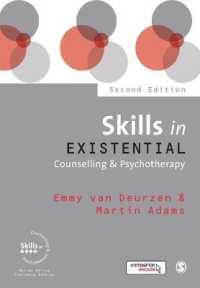基本説明
This text book presents teachers, administrators, and researchers with a linguistic approach to teaching reading in different subject areas - an approach that focuses on language itself.
Full Description
What does it mean to teach reading in the context of the middle and high school classroom? Don't students already know how to read by the time they get to secondary school? And how can a busy teacher take time away from the packed curriculum of science, history, mathematics, or language arts to teach reading?
This book presents a linguistic approach to teaching reading in different subjects; an approach that focuses on language itself. Central to this approach is a view that knowledge is constructed in and through language and that language changes with changes in knowledge. As students move from elementary to secondary schools, they encounter specialized knowledge and engage in new contexts of learning in all subjects. This means that the language of secondary school learning is quite different from the language of the elementary years. While in the elementary years the subject matter of reading materials is often close to students' everyday life experiences, the curriculum of secondary school deals with knowledge that is removed from students' personal lives and everyday contexts. The language that constructs this more specialized knowledge thus tends to be more abstract, technical, information-laden, and hierarchically organized than the more familiar and "friendly" language that students typically encounter during the elementary years. Students need to develop specialized literacies (literacy relevant to each content area) as well as a critical literacy they can use across subject areas to engage with, reflect on, and assess specialized and advanced knowledge.
This functional language analysis approach is shown using actual secondary social studies, science, and math textbooks and using a literary text.
-

- 電子書籍
- メロイックなキスをあなたに 3






